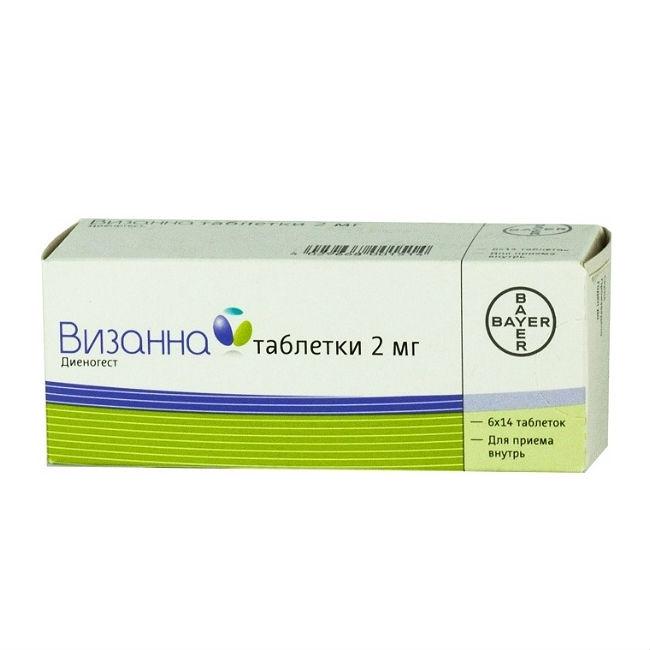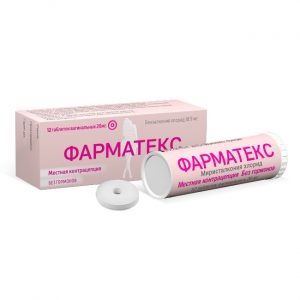Description
Release form
Tablets
Packing
84 pcs.
Pharmacological action of
Vizanne is a derivative of nortestosterone that does not have androgenic activity, but has a significant antiandrogenic effect, which is about one third of the activity of cyproterone acetate.
Dienogest binds to progesterone receptors in the human uterus, while having only 10% of the relative affinity of progesterone. Despite its low affinity for progesterone receptors, dienogest is characterized by a powerful progestogen effect in vivo.
Dienogest does not have significant androgenic, mineralocorticoid, or glucocorticoid activity in vivo.
Dienogest acts on endometriosis, reducing the endogenous production of estradiol and thereby suppressing its trophic effects on both eutopic and ectopic endometrium. With continuous use, dienogest creates a hypoestrogenic, hypergestagenic endocrine environment, causing initial decidualization of endometrial tissue with subsequent atrophy of the endometriotic foci.
Additional properties of dienogest, such as immunological and anti-angiogenic effects, obviously contribute to its inhibitory effect on cell proliferation.
Contraindications
Byzanne should not be used in the presence of any of the following conditions, which are partially taken from information on other drugs containing only the progestogen component. If any of these conditions develops while taking Vizanne, the use of the drug should be stopped immediately.
– active venous thromboembolic conditions
– diseases of the heart and blood vessels (e.g. myocardial infarction, stroke, coronary heart disease) currently or in the past
– diabetes mellitus with vascular complications
– severe liver disease now or in the past, until the liver function returns to normal
– liver tumors (benign and malignant) current or past
– identified or suspected malignant tumors dependent on sex steroids
– vaginal bleeding of unknown origin
– hypersensitivity to the active substance whether any of the excipients.
Special instructions
Pregnancy must be excluded before starting Vizanne. When taking Vizanne, if contraception is necessary, patients are advised to use non-hormonal contraceptive methods (for example, the barrier method).
In pregnancy, women who use contraceptives with only a progestogen component (for example, mini-saws) are more likely to have ectopic localization than pregnancy, arising from the use of combined oral contraceptives. Therefore, the question of the use of Vizanne in women with an ectopic pregnancy in the anamnesis or with a dysfunction of the fallopian tubes should be decided only after a careful assessment of the ratio of benefits and risks.
Since Vizanne is a preparation with only a progestogen component, it can be assumed that special warnings and precautions for using other drugs with a progestational component are also applicable to the use of Vizanna, although not all warnings and precautions are based on the corresponding results in clinical trials Byzanne.
If you have or worsen any of the following conditions or risk factors, Before starting or continuing taking Vizanne, an individual assessment of the risk / benefit ratio should be carried out.
Composition
One tablet contains: dienogest 2 mg.
Excipients: lactose monohydrate, potato starch, microcrystalline cellulose, povidone K25, talc, crospovidone, magnesium stearate.
Dosage and administration
For oral administration. Pills can be started on any day of the menstrual cycle. Take one tablet per day without a break, preferably at the same time every day, if necessary, washed down with liquid. Tablets must be taken continuously, regardless of vaginal bleeding. After the completion of one package, they start taking the next one without interruption in taking the tablets. The effectiveness of Vizanne may decrease with skipping tablets, with vomiting and / or diarrhea (if this occurs within 3-4 hours after taking the pill). If one or more tablets are missed, a woman should take only one tablet as soon as she remembers it, and then the next day, continue taking the tablets at the usual time. An unabsorbed tablet due to vomiting or diarrhea should be replaced with an additional dose of one tablet. There is no corresponding indication for the use of Vizanna in elderly patients. No data available indicating the need for dose adjustment in patients with renal failure.
) Side effects of
Side effects are more likely to occur in the first months of taking Vizanna and their frequency decreases during treatment with the drug.
The following side effects were observed in women with Vizanna.
The most common side effects during the treatment of Vizannaya, which, at least, were considered as possibly related to taking the drug, include: headache (9.0%), discomfort in the mammary glands (5.4%), decreased mood ( 5.1%) and acne (5.1%).
The following are less than Yelnia drug reactions, distributed by Classes organ system according to MedDRA – Medical dictionary for regulatory activities
side effects in each frequency band are presented in order of decreasing frequency.. Frequency indicators are based on pooled data from four clinical trials involving 332 patients (100%).
Often (? 1/100 and Infrequently (? 1/1000 to
Drug interactions
Individual inducers or inhibitors of enzymes (CYP3A isoenzyme): Gestagens, including dienogest, are metabolized predominantly by the P450 3A4 cytochrome system (CYP3A4), localized both in the intestinal mucosa and in the liver. Therefore, inducers or inhibitors of CYP3A4 can affect the metabolism of progestational drugs. Increased clearance of sex hormones due to the induction of enzymes can lead to a decrease in the therapeutic effect of Vizanne, as well as cause side effects, for example, a change in the nature of uterine bleeding.
Decreased clearance of sex hormones due to inhibition of enzymes can increase the exposure of dienogest, which can lead to the development of side effects.
Substances that can induce enzymes:
The use of drugs that induce microsomal liver enzymes (for example, enzymes of the cytochrome P450 system) can lead to increased clearance of sex hormones. Such drugs include phenytoin, barbiturates, primidone, carbamazepine and rifampicin. There are also suggestions for oxcarbazepine, topiramate, felbamate, ritonavir and griseofulvin, nevirapine and St. John’s wort preparations. The maximum induction of enzymes, as a rule, is noted no earlier than after 2-3 weeks, however, it can then persist for at least 4 weeks after discontinuation of therapy.
Enzyme-inhibiting substances: Known CYP3A4 inhibitors, such as azole antifungals (e.g. ketoconazole, itraconazole, fluconazole), cimetidine, verapamil, macrolides (e.g. erythromycin, clarithromycin, and roxithromitazin, e.g. saquinavir, indinavir, nelfinavir), antidepressants (for example, nefazodone, fluvoxamine, fluoxetine) and grapefruit juice, can increase the concentration of gestagens in blood plasma and lead to the development of side effects.
Effect of dienogest on other drugs: Based on data from in vitro inhibition studies, the development of clinically significant interaction of Vizanne with the metabolism of other drugs with the participation of enzymes of the cytochrome P450 system is unlikely.
Food Interactions: Standardized, high-fat meals did not affect the bioavailability of Vizanne.
Other interactions:
Progestogen administration may affect the results of some laboratory tests, including biochemical parameters of liver, thyroid, adrenal and renal function, plasma protein concentrations, such as lipid / lipoprotein fractions, carbohydrate metabolism parameters and coagulation parameters. Changes usually do not go beyond the normal range.
Storage conditions
Store at a temperature not exceeding 30 ° C. Keep out of the reach of children.
Deystvuyuschee substances
dienogest
Terms and conditions otpuska IZ drugstore
prescription
Formulation
tablets
Indications sr47l16
Bayer Pharma AG, Germany




